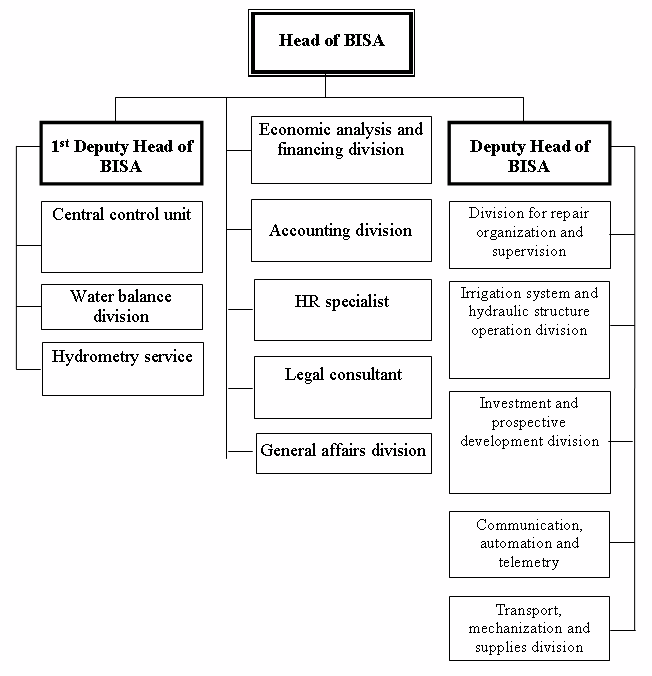
To the beginning of the section
The main types of WMOs (in case of Uzbekistan) are the Central Water Management Administration (CWMA), Basin Irrigation System Authorities (BISA), Irrigation System Authorities (ISA), Main Canal Authority (MCA), Pumping Station Administrations (PSA), and Association of Hydrogeology and Land Reclamation Field Offices (AHLRFO). O&M activity is coordinated by WMO’s administration (Fig. 1).

Figure 1. Typical organizational set-up of BISA
Better governance of WMO can be achieved if the following is born in mind: 1) the ultimate aim of management process - making the organization more productive and effective for near and far future; 2) WMO is to develop four roles of management:
• (P)roducing results — the first and foremost role of an organization is to produce results. The result to be produced - the basic reason for existence of the organization.
• (A)dministering — focuses on how to do things to ensure effectiveness.
• (E)ntrepreneuring — drives the organization to successfully adapt to change.
• (I)ntegrating — focuses on the development of a cohesive team that makes the organization efficient over the long term.
For good health WMO needs to have all four roles. Absence of any of the roles threatens by disease – poor management. To ensure better roles, WMO must possess appropriate capacities (institutional, human, engineering).
The analysis of water management shows that WMOs have relatively successful roles of producing (P) and administering (A) that are oriented towards short-term tasks. The other two roles (entrepreneuring (E) and integrating (I)) that are oriented towards mid- and long-term tasks are not so successful due to lack of necessary human and organizational capacities at all levels of hierarchy.
The management structure of WMO is comprised of three elements:
• Responsibility (duties).
• Empowerment.
• Rewards.
WMO should meet all the above three conditions for effective performance of its staff: a staff-member knows his/her duties, is enough empowered to fulfill his/her duties, and relies on adequate rewards.
Author: Mirzaev N.N., SIC ICWC